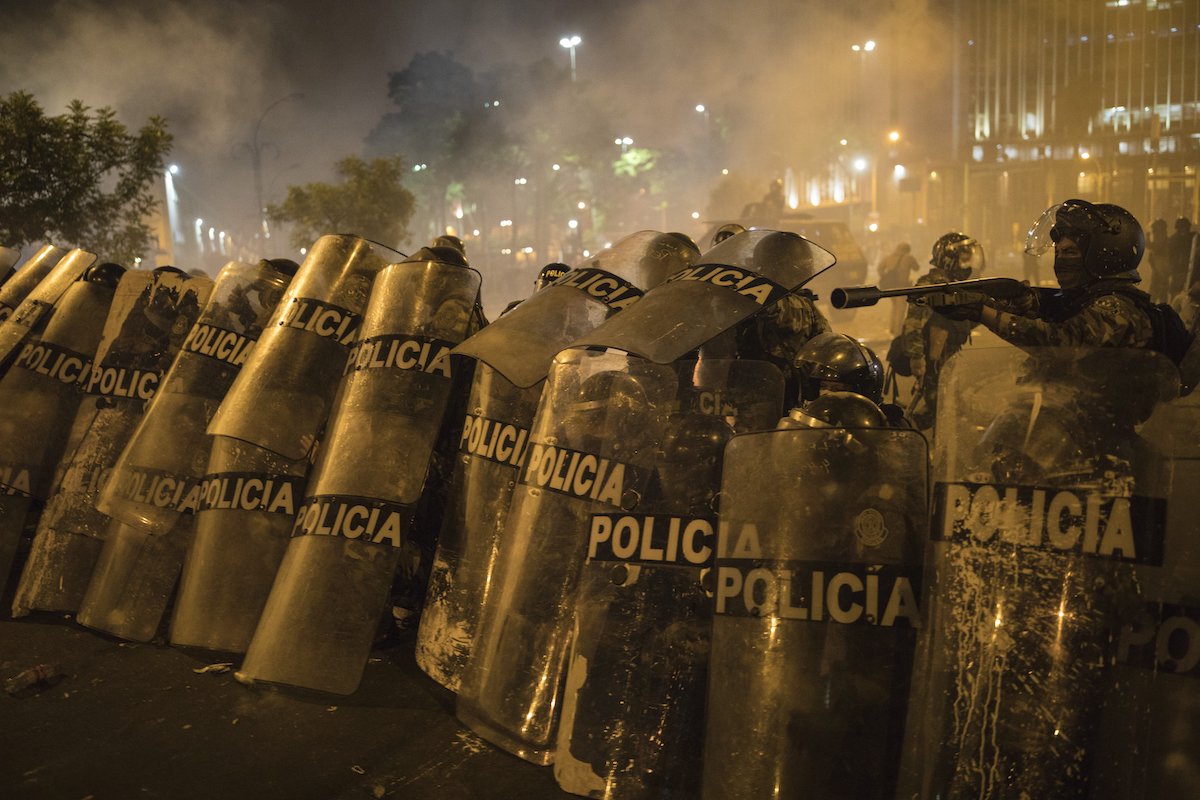

Police officers shield themselves from rocks thrown by protesters who were trying to march to Congress in a demonstration against the removal of President Martín Vizcarra, in Lima, Peru, Thursday, November 12, 2020. (AP Photo/Rodrigo Abd)
LIMA, Peru (AP) — A judge barred former Peruvian President Martín Vizcarra from leaving the nation for 18 months Friday while prosecutors investigate bribery allegations that Congress used to oust him, plunging the nation into a political crisis.
Judge María de los Ángeles Álvarez agreed with prosecutors that Vizcarra could present a flight risk, given the seriousness of the accusations, though he will still be allowed to move freely within the country until the order expires.
The case against the popular leader —whose ouster has been criticized by international organizations— is still in the preliminary stage. Prosecutors are investigating whether Vizcarra received over $630,000 while serving as governor of a small province in southern Peru in exchange for two construction projects.
Vizcarra forcefully denied the charges Monday before Congress, but lawmakers utilized a provision within Peru’s laws dating back to the 19th century that allows them to remove a president on the grounds of “moral incapacity.”
Their decision has sparked daily protests by Peruvians accusing Congress—half of whose members themselves are under investigation – of abusing the constitution. The demonstrators are refusing to recognize the new government of Manuel Merino, a little-known politician who was previously head of the legislature.
Prosecutor Germán Juárez said the allegations come from two confidential witnesses accused in a separate corruption case but that additional evidence has also been found. Vizcarra allegedly provided information that helped set the price on a winning bid for a construction project and requested 2% in return, according to their testimony.
The prosecutor said Vizcarra allegedly remarked that the construction managers wanted to “eat the cake alone” and should share the benefits.
He also pointed to the rental of a small plane to take several Bolivians —including now President Luis Arce— from Lima to a port city in southern Peru. The accusers claim Vizcarra asked a construction firm to rent the plane as part of the bribe. Investigators found emails indicating the plane was indeed rented.


Peru’s President Martín Vizcarra waves to reporters during a press conference at the presidential palace in Lima, Peru, after lawmakers voted his impeachment on Monday, November 9, 2020, (AP Photo/Martin Mejia)
Vizcarra allegedly sent a list of the passengers, which included Arce.
Noting that Arce is now Bolivia’s president, Juárez raised questions about how that connection might contribute to this flight risk.
“He could go to that country,” he said. “He could seek asylum.”
Vizcarra’s defense attorney questioned the veracity of the claims, pointing out that the witnesses have a motive to provide incriminating information since their potential jail time could be reduced. He also questioned the timing of their declarations.
The testimony in the virtual hearing presented some of the most detailed information yet about the claims against the ex-president. Vizcarra had become the face of Peru’s still-nascent anti-corruption movement in recent years. He pushed measures to reform how judges are chosen and tried to lift legislators’ immunity from prosecution. Those measures made him popular with Peruvians but didn’t sit well with many in Congress.
Polls show Peruvians overwhelmingly wanted Vizcarra to stay in office, preferring that he serve out the remainder of his term, which ends in July, and then be investigated. International organizations and analysts have questioned Congress’ use of the “moral incapacity” clause and say it put the nation’s democracy at risk.


